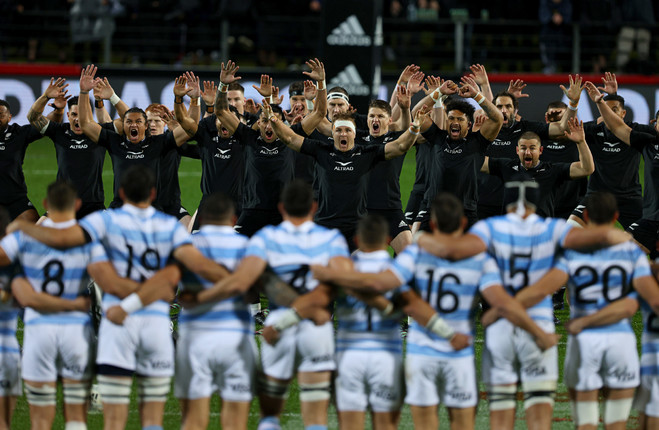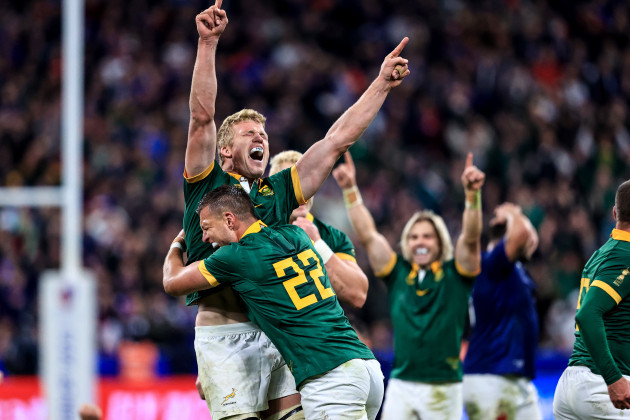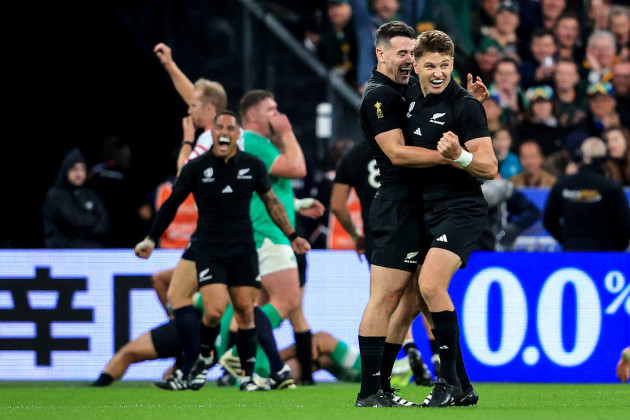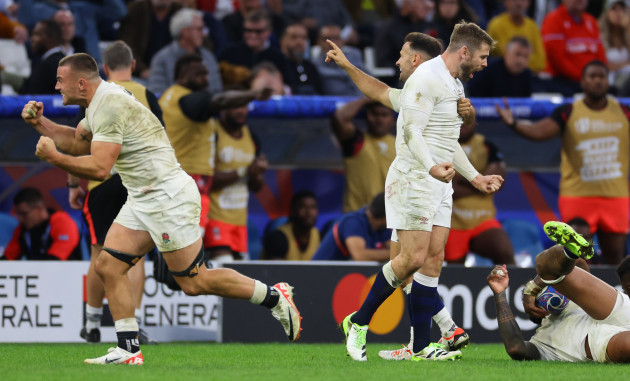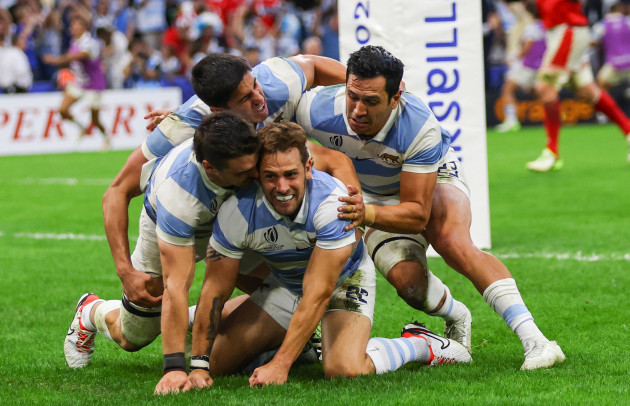1. South Africa
Hier kom die Bokke.
The reigning champions are on the march once more and are justifiable favourites to defend their crown.
In an all-time great quarter-final with France, so much of South Africa’s outside-the-box thinking — some of which might have felt experimental or even gimmicky earlier in the tournament — bore fruit.
Juxtaposed with our expectations of South African teams throughout history, Rassie Erasmus and his coaching staff have proven themselves the game’s greatest innovators at this level. Look no further than Damian Willemse’s decision to call a scrum off a mark against the French, or the reasoning behind it.
“France don’t give you a lot of scrums, they don’t play a lot of rugby in the half, and you never get time to actually scrum against them,” Erasmus explained afterwards.
“I think the previous match [France v South Africa in November 2022], we had one scrum in the whole game.
“They love kicking long kicks that land in your 22, and then you have two options: you kick the ball out, it’s their lineout, or you try and run it back to the 10-yard line where they stand waiting for you to win a big turnover.
“We try to get as many scrums [as we can], and I think after that, their kicks were much shorter or let it bounce into the 22.
“So it was definitely pre-planned and not necessarily because we thought that we would be dominant in the scrums, but just to get into the fatigue side of things and get to scrum against those big boys, who must then run across the park and are not standing in the middle of the field.”
Rassie Erasmus explains Damian Willemse’s scrum call from the mark in his 22. 🤔
— Jared Wright (@jaredwright17) October 16, 2023
🎥: @ForeverSportsOn #RWC2023 pic.twitter.com/4u7xFDdk1i
With Erasmus, Jacques Nienaber and Felix Jones at the vanguard, the Boks are gradually changing how we think about the game and, on the field, they have added dimensions which make them an even more formidable side than that which went the whole way four years ago.
Even the Bomb Squad has gone thermonuclear, with half-backs of the calibre of Faf de Klerk and Handre Pollard fusing with the usual explosives to create an even more profound impact off the bench.
And, ultimately, the core of the Boks’ greatness is still their extraordinary playing talent, and more pertinently the depth of it, which allows them to finish a game at least as strongly as they began it.
That could prove key in a game with England which on paper looks one-sided but in reality will take some winning.
So too could the South Africans’ composure, which was among the more amazing aspects of their mind-blowing quarter-final.
Facing the tournament hosts in front of 75-odd-thousand French supporters who had awaited this game literally for years and brought with them into the stands a commensurately feral intensity, it was the ‘Boks whose heads held up better than those of Les Bleus opposite them. Ultimately, they made better decisions than France throughout the game and they converted far fewer 22 entries into more points.
Rassie’s mentality monsters will surely boast that advantage over England who, in fairness, are no longer a scatter-brained mess but, at the same time, have not been exposed to anywhere near the level of pressure that South Africa will inflict upon them on Saturday.
The final four years ago consisted of an unfancied team with an apparently reductive, kick-heavy gameplan, a strong set piece, and a favourable draw, and a more well-rounded side who had just knocked out the tournament favourites with one of their greatest ever performances.
Those roles have been entirely reversed for Saturday’s semi.
2. New Zealand
Like South Africa against England, the most pressing danger for New Zealand in their semi-final with Argentina is that they will surely this week endure an emotional comedown from their quarter-final heroics.
While it remains too early to suggest that the ‘All Blacks are back’ — at least to their all-conquering, legitimately feared best — Ian Foster’s side proved against Ireland that the extent of their relative demise has been greatly exaggerated.
It was clear during that the Rugby Championship that this New Zealand team was a different beast than the one whose castle was sacked by Ireland last summer; they were marginal favourites to lift the Webb Ellis Cup a couple of weeks before the competition only for a heavy warm-up defeat to South Africa and a comprehensive loss to France in the tournament curtain-raiser to temper expectations.
Twickenham and Paris were different kinds of quashings but what they had in common is that they accentuated the pre-existing sentiment that the All Blacks’ pack wouldn’t be able to stand and trade with its fellow heavyweights.
Joe Schmidt, who is probably still the best breakdown coach in the world, and Jason Ryan soon disabused us of that notion.
To put it frankly, New Zealand beat Ireland at their own game on the ground. On both sides of the ball, they rucked with a combination of speed, accuracy and intensity that ultimately can offset any supposed power deficiency.
They defended narrow and conceded the edges, trusting in their incredibly athletic midfield and back three to scramble; bending but rarely breaking.
It was a masterclass in both planning and performance, tailor-made to stifle Ireland.
What remained true of this All Black side even during their 2022 nadir was that their potency in transition was unparalleled, and that they boasted the profile of athlete in their back three especially that could take the ball to the house even from deep inside their own territory.
Again, having added Schmidt to the equation, New Zealand have begun to run that electricity through their structured attack. They shocked France in Paris, at least early on, and they positively fried Ireland, including with the brilliant lineout strike play that sent Richie Mo’unga clear for Will Jordan to dot down the decisive score.
The All Blacks are also just a smarter team than they were even earlier this year, particularly around their kick game and, crucially, how seamlessly they’re able to transition into their attacking shape off a kick chase (See: Leicester Fainga’anuku’s score against Ireland following Beauden Barrett’s chip).
New Zealand will have already identified Argentina’s blind spots around the ruck and they’ll have a detailed plan in place as to how to exploit them.
As much as anything, a highly probable final with South Africa will make for a fascinating tactical battle which, for several reasons, would have been inconceivable before Ian Foster shuffled his coaching ticket last year.
3. England
Well, well, well… What do we have here?
For one thing, we have the sole semi-final representative from the northern hemisphere. For another, and even more jarringly, we have the last undefeated team left in the competition.
It would be easy to discredit England’s progress to the last four by pointing out caveats such as the tournament draw, the fact that pool rivals Argentina were clearly backloading their own run, or the reality that quarter-final opponent Fiji’s whole tournament was deeply compromised by the absence of their star out-half Caleb Muntz.
Yeah, no, that was the end of that sentence – there was no ‘but’.
Okay, okay — here’s the ‘but’: England’s side of the draw was always going to make like a red carpet for the two teams who could get their S-H-you-know-what together — and in a short space of time, England have become a far more fundamentally sound team than Australia, Fiji, Wales, and even the Pumas in the other semi.
Considering the ebb at which they entered the tournament, that’s a genuine feather in the cap of Steve Borthwick and his staff, most notably Kevin Sinfield whose defence was being ridiculed only six or seven weeks ago.
A lot of their talk pre-tournament felt like lip service but actually, England backed up almost all of it. There is an undeniable togetherness to their group and, suddenly, all of those wild over-celebrations of minor moments have a hue of legitimacy to them rather than reeking of desperation.
Can they beat South Africa? Probably not. But can they run them close? Honestly… maybe.
Their attack is rudimentary but has thus far been effective. More importantly, it doesn’t lend itself towards the kinds of mistakes upon which the ‘Boks were able to seize against France.
Their set-piece looks decent. Their kicking game is definitely decent. Star men like Owen Farrell and Manu Tuilagi are on song. Their best player, Ben Earl, is capable of putting a dent in any team.
It remains to be seen if they’ll be able to muster the level of collective belligerence required to turn this game into a low-scoring arm-wrestle — perhaps something akin to South Africa’s nail-biting semi with Wales four years ago — which would be their only true chance of winning.
Credit where it’s due, though: that thought is a lot less ludicrous than it was even last month.
4. Argentina
Head coach Michael Cheika is the only man to have ever steered teams to continental titles in both hemispheres, with Leinster in 2009 and the Waratahs in 2014. He also led the relatively unfancied Wallabies to a World Cup final in 2015.
Point being: Cheika knows how to navigate knockout rugby — and Argentina’s upward curve throughout this tournament looks too steady for it not to have been deliberate.
That’s not to suggest that Cheika or his Pumas deliberately made a hames of their pool opener with England, obviously. There’s no way he could have foreseen them capitulating to that degree, particularly against 14 men.
But zoom out by a few more weeks and the whole thing pretty much clicks into place.
In contrast to all of the other, busier Tier 1 nations, Argentina played just one game in the five weeks before the tournament — against Spain a fortnight before they met England.
They melted in the comparable heat of battle against Borthwick’s side. They trudged through a truly awful spectacle against the dangerous Samoa. They hockeyed Chile.
Then came what was ostensibly a knockout game against Japan, the winner of which would emerge from Pool D alongside England. Argentina produced their best performance of the tournament to book a quarter-final with Wales.
They then turfed out the Welsh with a better performance again.
The Pumas don’t have the same depth of talent as most of the other Tier 1 nations but, after a lower-octane build-up and beginning, they’ve made it to a semi-final having lost only influential back row Pablo Matera for the tournament along the way.
For all intents and purposes, Cheika has already achieved his tournament objective while ensuring his players would be in the best-possible condition to better it.
As we suspected before the Ireland-New Zealand quarter-final and as we know for damn sure now, there is little point in lending any credence to Argentina’s first ever victory on Kiwi soil last year at least as it pertains to this semi.
What we don’t know yet is what Peak Cheika’s Argentina looks like — or whether or not we actually watched it against Wales.
Unless they can up the ante to another level again, the suspicion is that there are still too many chinks in the Pumas’ armour — particularly in defence — to shock the All Blacks.
Again, though, Friday’s semi has the potential to prove a more competitive spectacle than people expect.
